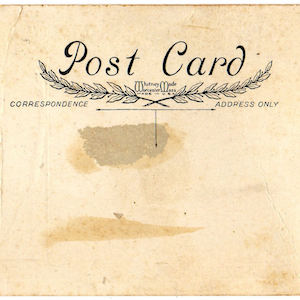Bessie Smith Postcards
DARLING, MISSISSIPPI, ‘37
Bessie Smith’s Postcard from a Car Wreck
&
Here I am in ‘37, my future behind me. I look up into the overcast sky. The beach sun glowers grey as the gin I drank for breakfast. I kick up sand the charbroiled brown of my whiskey shooter lunch. “I Need a Little Sugar in My Bowl.” Listen, don’t judge the Empress, you’re not six-feet tall like me, Bessie Smith, or gold-toothed like Ma Rainey. I’m lounging in the Packard, my right arm about to be amputated in the fatal car accident—limb swaddled in newspaper, grey fingers, each a miniature silver-trimmed coffin. Sadness balloons its tough slab of oarfish. You ask me why I married a man named Earl Love. Marriage is an alms-house. A pest-house. I want my men cut rough like Porterhouse steaks. For women, I like filet mignon. Take Boula Lee, my sarong-wearing chorister, and Gladys, the smoothest male impersonator (her bangs hid her pretty cow eyes). My latest husband is the third in his line of worthless men I’ve chased with a gun.
“Tain’t Nobody’s Business if I Do.”
I’m going for a swim. Let the current get violent as my temper and grab my legs out under me and waves strong as me and Ma belting a duet splash my head. That toothsome Lily, might have been the one. A small-boned flower, her boy body ripened into an hourglass of breasts. Only her legs—thin and straight—stayed boy. Remembered air gives off an odor of rose cream and burning hot combs. Bring me my feathers. Lay me out infringes of ermine and sequins for the ten thousand who’ll come to say goodbye. Throw my funeral in a honky tonk and plant me out back without a headstone. I’ll brush off my voice and grunt like a Carnegie Hall hog wallow, “Gimme a Pigfoot.” Give me a minute and I’ll throw diction at you, spit my phrases smooth as bathtub brandy. Let’s have a swim and a bottle before dusk. I’m a verbatim gal. Hurry up, it’s on its way, the death train I’ve got to catch.
JEFFERSON PARISH, LA, ‘36
Zetta, the Morning After—
A One-Night Stand with Bessie Smith
&
I’m walking the road shoulder, my head lost in black trees. At my back, a cold hand breathes as animals do—birds wading the smell of fire. After being up all night I can talk to the black gnats with their fiery red eyes. I hum at them like thunder. Look at my feet, I tell the grasshoppers, and allow them to plant kisses. I hear Daddy’s old truck. Tired, I make myself run, hiding in the ditch bottom’s weedy slop, let the avenging angel’s dirty sword pass over me. The little two-ton hauling truck crackles gravel slow. Get in, your brother’s sick. I should have known the way he lifts his hands off the steering wheel, his eyes not meeting mine, he’s lying. His eyes pinch the same as those blue crabs he accuses me of smelling like. The swamp thickness. Then comes his fist, not sorry, he hit me and will again if I ever stay out straggling home with the sun. Where was you? I’m not saying although I imagine her tongue of the sea’s leftovers, her silver mouth crooning the blues. As it is I can’t look at him, his stinking of rut-gut and chewing tobacco, his men-friends and their out-of-gas chatter. I stare out the window most of the way to New Orleans. The flatland melting into swamp, her hand on my rib, where light hangs like slips from the branches and the cranes, those disembodied pharaohs, wade deeper into simmering green chowder. The swamp water’s clean but it looks unhealthy in its overcast and humidity and stillness. I was her naked raw baby curled up like a minnow. Her eyelids heavy as mercury, half-closed. Not a breath to blow out the smell of us both needing baths. She tells me teasingly, You rotten little minnow. I knew we’d be meeting when she crushed me against her. Rain doesn’t come quick enough, Daddy says, trying to make up. We pass the drowned trees, the nests of last year’s herons fermenting. Don’t you dare hit me again, old man. I shake my ringlets, free the monarch butterflies and tree hoppers hiding in my hair. All night woman-fucking. Everything pouring into me.
CHATTANOOGA, TENNESSEE, ‘11
Bessie Smith Wonders
Where Her Parents Came From
(& Where They Went)
My parents and two brothers died before I reached the age of eight. My head hot, breeze sifts through the sleepwalking trees, the clouds floating three-headed birds I keep trying to catch. Bessie is a friendly easy place but cold-hearted Smith comes with a chain gang attached. The hog raised from piglet as my friend bleeds on the blade, dies mewling my name. The deep dirt is home. Like the white scent unreal in the fleshy leaves, I darken in the breeze. Fragrance envelopes. I fake it all—the wiggle, the Dutchboy hair I put into my song. I want to gallop and dance. Let my fingers brush laughter. Let the breath of the outside waft in through the bar stools. How did I get here? The light whispers about knowing Angola, the Kalahari Desert, miles of red dunes, about Cameroon. Staring off into the thorn bush the light sees how they’ve been marked by the long-limbed men and women being marched to the Slave Coast. Are my great-grandparents among them? Flee. Go east by the broad-leafed doka trees, these are the directions home. Follow the eland herd, the dagger-like antelopes, their long spiral-horns white as salt. They know the way home. Sometimes I wake up in the dreams of escaped slaves—the springbok frozen in their manacled sleep. Here are velvet ant ghosts and ladybug phantoms but they are dim in the split instant afterglow. I tell my orphaned self we will learn together to love the spur throated grasshopper and the squash bug. Fooled by the spotted camel cricket into seeing desert sand and bands of men, I’m chained to a Middle Passage captive who weeps endlessly—marooned.











